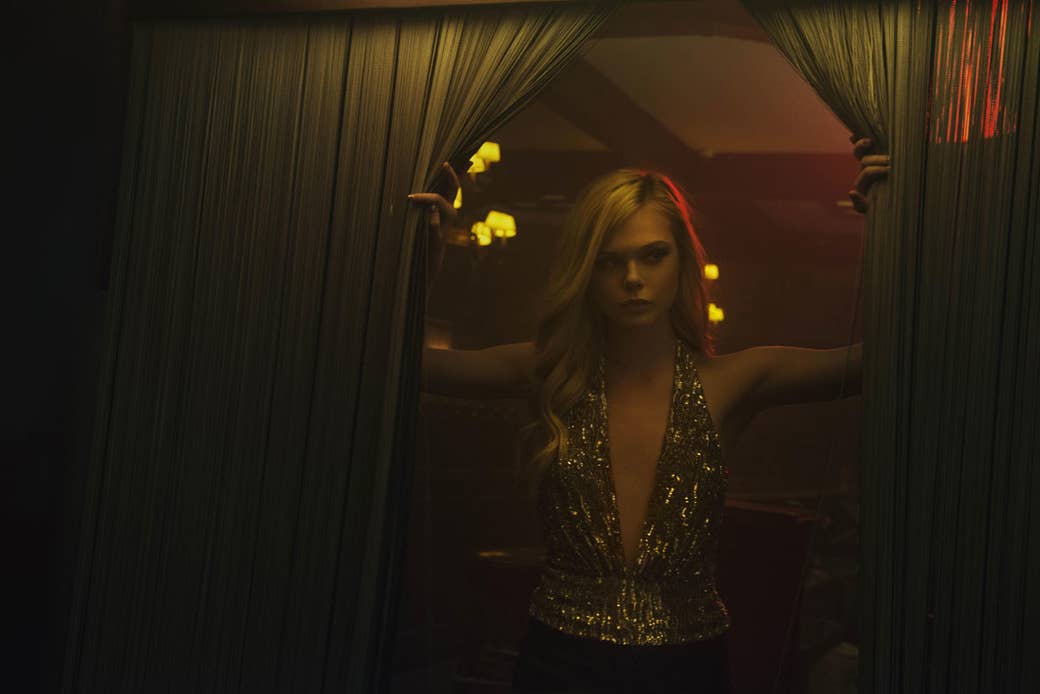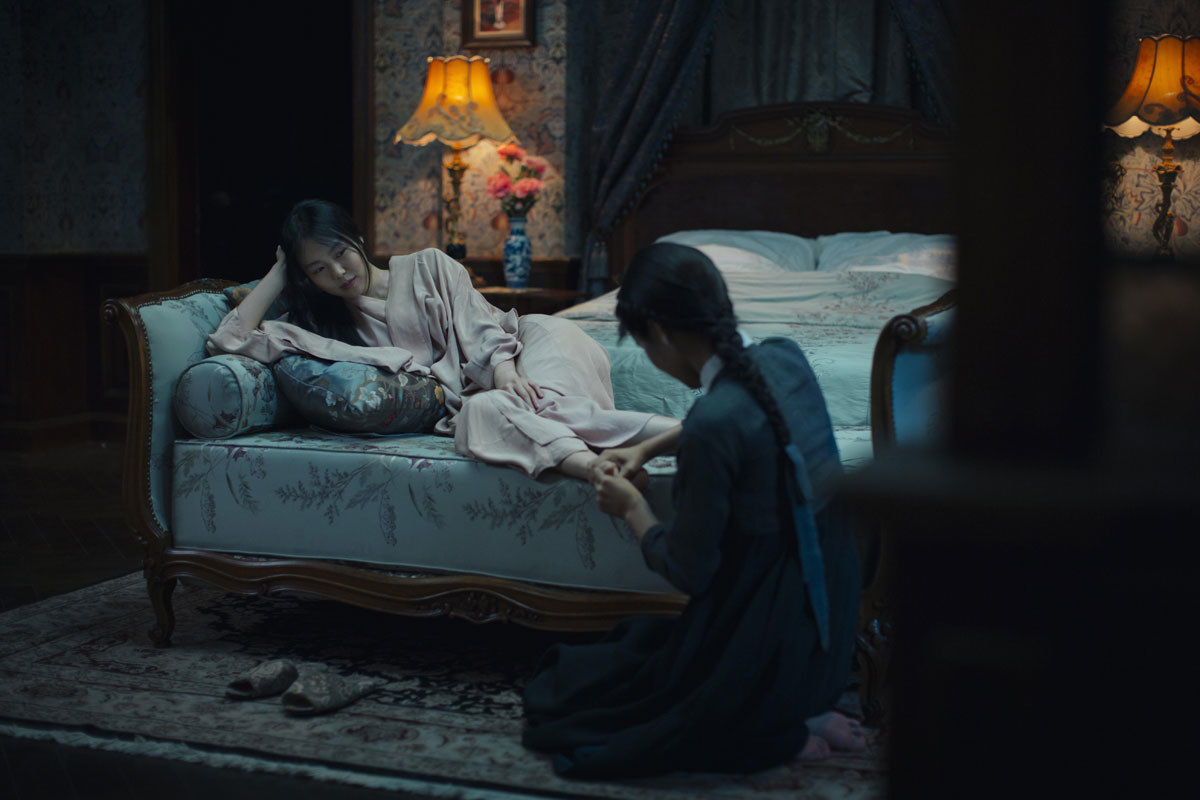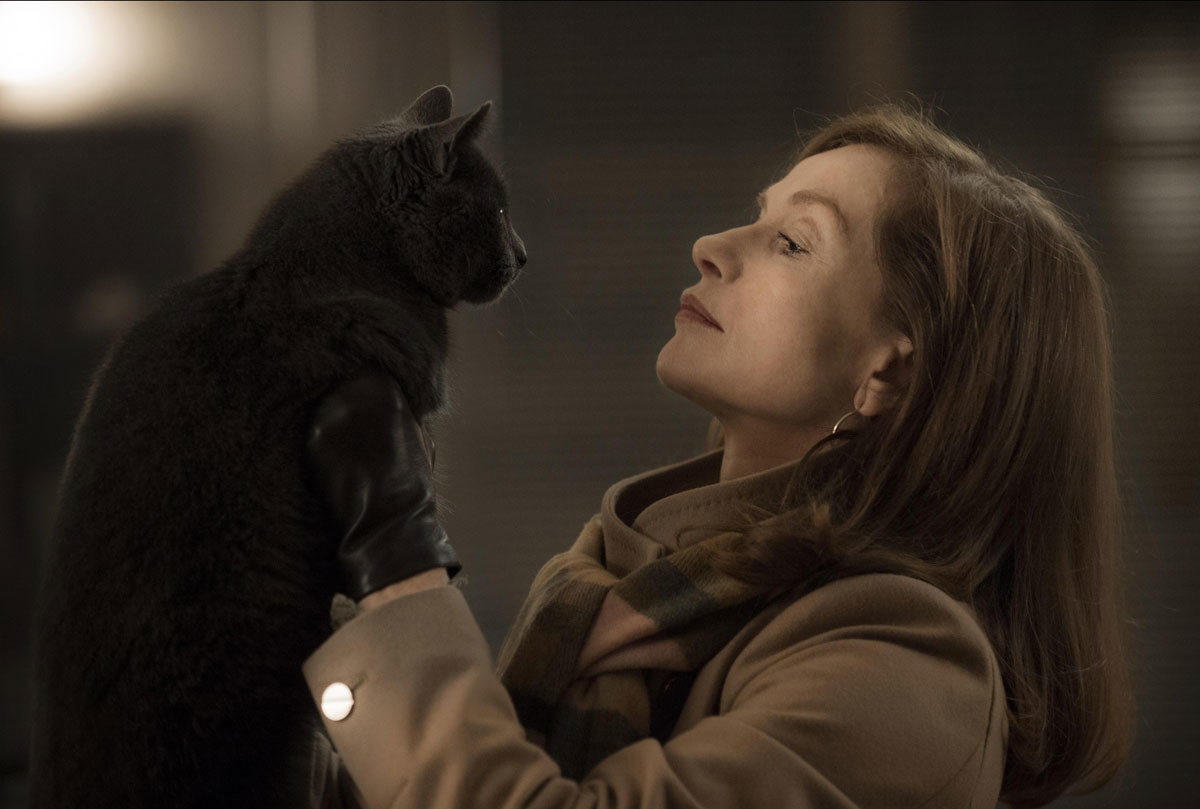
The Neon Demon opens with a gorgeous, disturbing shot of Elle Fanning posing like a high-fashion murder mannequin, selling sex and violence as if the two have interchangeable appeal — her face covered in gem decals and her body in blood as she's sprawled over a chaise like she's just had her throat slit. The Handmaiden is a lesbian romance whose main characters control the narrative except when they have sumptuously filmed intercourse, at which point the perspective retreats to the ideal distance from which to leer as they 69. And Elle starts with its heroine getting raped, and then becomes a revenge story of sorts, but not before the victim forms a relationship with her attacker that should launch a million fiery think pieces.
Behold the problematic faves of this year's Cannes Film Festival — movies that are deftly made, headily stylish, and cracklingly clever, and that nevertheless require a "but..." But it's about a character who sleeps with her rapist. But it's incredibly male-gaze-y. But it's populated with women who literally devour each other while trying to be the fairest one of all.
Cannes has been home to plenty of controversial and outrageous movies. Just last year, Gaspar Noé offered formalwear-clad audiences unsimulated sex and an ejaculation right at the camera, all in 3D. But The Neon Demon, The Handmaiden, and Elle aren't controversial, not in bomb-throwing ways that aim to make people walk out of the theater. Their asterisks are as worth exploring as all the things they do well.

Take The Neon Demon, the latest from Drive's Nicolas Winding Refn, a director who wears his many fetishes on his sleeve, and who's consumed with highly stylized, electro-scored fables about anguished men. This new one is actually about a woman, or rather a teenage girl named Jesse (Fanning), who was orphaned at 16 and has newly arrived in a dreamlike L.A., with aims of making it big in modeling. She has drifted into a dark industry comedy by way of Dario Argento, a syrupy world where identically long-legged women strut in lingerie for higher-ups who evaluate them with the cool eyes of a gambler considering horseflesh, and where women are also regularly criticized or fired in front of rooms full of people — just business, you know. But Jesse is different as she strolls into agency representation, a shoot with famous photographers, and a gig with an established designer. Everyone looks at Jesse with a hunger that's not quite lust, as if yearning to suck the dewy youth, the newness out of her bones.
The Neon Demon is a toxic fairy tale, but Refn is too in love with its toxicity for anything as prosaic as a critique. Everyone in it has been warped, like cutthroat models Sarah (Abbey Lee) and Gigi (Bella Heathcote), who've internalized the brisk cruelty of the industry rather than built up defenses against it, interested only in attacking rivals rather than uniting against the people treating them as discardable.
The movie is a bloody-mawed catfight on hallucinogens, but the visual splendor doesn't change the fact that the film barely has characters. Instead, it has shadow figures in the dark, like Jena Malone's motherly-predatory makeup artist Ruby, or Desmond Harrington's aloof-predatory photog Jack, or Keanu Reeves, who's much fun as the sleazy-predatory owner of the motel in which Jesse stays. Jesse herself is an enigma, green but aware of and ever more confident in her own power. Refn creates a seductively surreal version of hyper-competitive showbiz, but he can't get inside his heroine's head and find the emotional core that his teary men always have, no matter how heightened their environments. It's not the sexualized violence or the woman-on-woman viciousness that's the film's weakness — it's the distance.

The Handmaiden has no trouble getting inside its main characters' heads. The film, directed by Oldboy provocateur Park Chan-wook, spends most of its runtime there, with Sook-hee (Kim Tae Ri) and Hideko (Kim Min-hee) narrating large sections from their own distinctively prickly points of view. Sook-hee is a thief masquerading as a meek lady's maid in order to help a con man in his scheme to marry a rich noblewoman. That noblewoman would be Hideko, who looks like a porcelain doll but who's harboring some very dark depths. Most of the movie is set in the labyrinthine of the half-British, half-Japanese mansion in which Hideko lives with her uncle, observing as desire builds between the two women, simmering over baths and scenes of one dressing the other.
The Handmaiden is based on Sarah Waters' 2002 novel Fingersmith, with the action transposed from Victorian England to Japan-occupied Korea in the 1930s. Fans of the book will likely find the film maddening in how it whips between being guided by its characters' growing attachment and gawking at it. It's not the sex itself, it's the way it's filmed, like it's an act the characters are performing for the camera rather than each other — one late explicit scene is the most hilariously gratuitous part of a largely unnecessary coda.
But The Handmaiden is sexy and twisty and so compelling despite this, lodging itself in the points of view of two women who are constantly underestimated by the men around them, and who learn to take advantage of how they're misjudged. With intrigue that includes the staged reading of erotica, you could argue that Sook-hee and Hideko end up reclaiming acts originally described for the enjoyment of men for themselves — if the enjoyment of men didn't seem so important in how they're portrayed.

The heroine of Elle, however, has no patience whatsoever for those who'd underestimate her. Her name is Michelle (played by the ferocious Isabelle Huppert) and she is the witheringly, fabulously unsentimental CEO of a video game company. Elle — which is directed by returnee from Hollywood Paul Verhoeven (of Total Recall, Showgirls and, more recently, Black Book) — is essentially a startlingly enjoyable character study with an extraordinarily difficult starting point. It opens with Michelle getting raped by a man in a ski mask who broke into her house, and who leaves her, bleeding, on the floor. Rather than call the cops, with whom she has a bad history, she cleans herself up, orders delivery, has her doofus son over for dinner, all the while turning the experience over in her mind, indulging in fantasies in which she beats her attacker's head in with an ashtray.
The assault isn't dismissed or made light of, despite Michelle's cool customer display. Rather, it's how Elle introduces itself as a film about what happens when you don't have the reactions people consider to be normal, an aspect of Michelle's life since she was a child. She isn't dead inside or unaffected, she simply has no interest in fitting herself to others' expectations of appropriate behavior — something that's also true in regard to her son's disastrous relationship, her elderly mother's disastrous relationship, as well as the programmers at her company who loathe and fear her. Unsure of how to tell those closest to her about what happened, she shruggingly informs them over dinner, and the way their shocked silence is interrupted by the waiter popping champagne is the kind of dark joke Elle specializes in.
The dearth of fucks Michelle has to give about the feelings of others is a sort of superpower, and Huppert's desert-worthy aridness and impeccable timing make this character one of her most enjoyable roles. Elle stumbles, but doesn't quite fumble the ball, when Michelle figures out the identity of her attacker, and makes some decisions that aren't unconventional so much as opaque. There's a difference between psychological complexity and having your otherwise smart cookie of a main character do things that put herself in danger, and Elle wades into territory in which the two get muddied.
The Neon Demon, The Handmaiden, and Elle are, after all, movies from button-pushing directors whose aims aren't always precise, even if their filmmaking is superbly on point. And I had the most fun arguing over Elle at this year's festival, an event that sometimes felt like it uses its art-for-art's-sake standing as a shield against such conversations. Movies don't exist in a vacuum, even at Cannes, but discussing their flaws also shouldn't mean they're dismissed.

